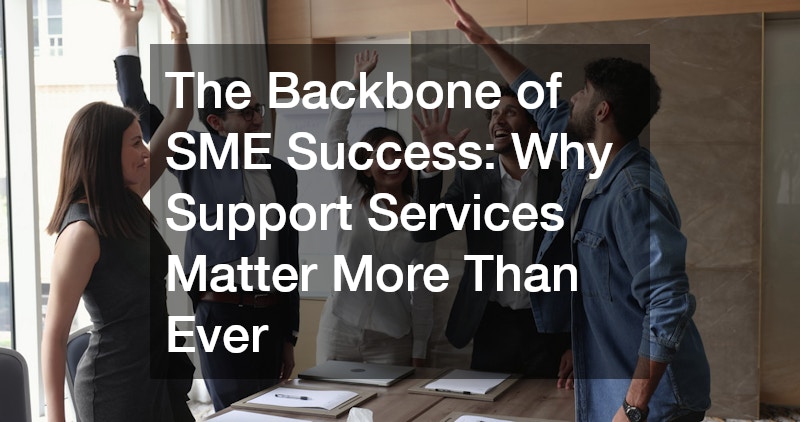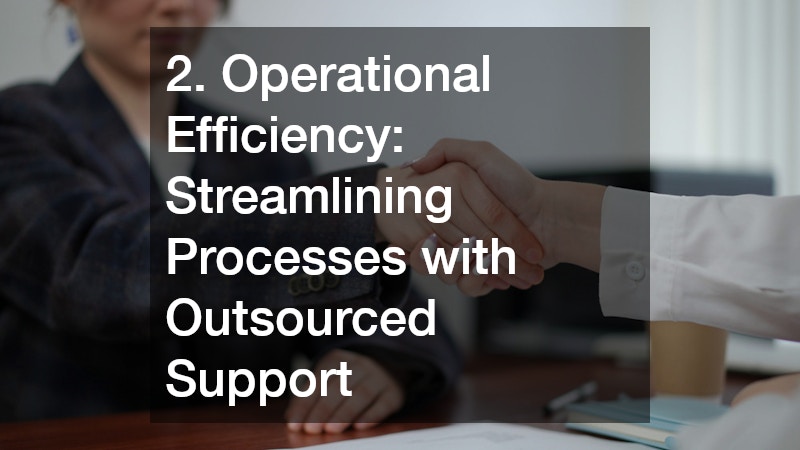

In today’s fast-changing business world, small and medium enterprises (SMEs) stand as the driving force behind economic growth and innovation. They create jobs, introduce new ideas, and strengthen local communities. However, running an SME is not without its challenges. From managing finances and marketing to maintaining operations and compliance, business owners often juggle multiple roles at once. This strain can limit their ability to focus on the most critical task — growing their enterprise.
That’s where professional support services come in. These services, ranging from accounting and logistics to consulting and marketing, form the backbone of SME success. They enable businesses to operate efficiently, stay compliant, reach customers, and make strategic decisions backed by expert insight.
In this article, we’ll explore why these support systems matter more than ever and how they empower SMEs to thrive in an increasingly competitive environment. From outsourcing back-office functions to partnering with marketing and consulting firms, we’ll examine the diverse ecosystem of services that make sustained success possible for small and medium-sized enterprises.
1. The Changing Landscape of SMEs
Over the past decade, the landscape for SMEs has transformed dramatically. Digital technology, globalization, and shifting consumer behaviors have created both opportunities and challenges. Entrepreneurs now compete not only with local businesses but also with global brands offering similar products and services online.
While digital tools have made it easier to reach customers, they’ve also increased the pressure to operate efficiently and maintain high service standards. Many SMEs lack the internal infrastructure and manpower to handle complex operations, financial tasks, or regulatory requirements. As a result, they often turn to external experts who can fill these critical gaps.
Moreover, the post-pandemic recovery has emphasized the importance of agility. Businesses that can quickly adapt to change — by outsourcing, automating, or consulting with specialists — tend to recover faster and grow stronger. In this competitive climate, no SME can afford to work in isolation. Strategic collaboration with specialized service providers has become essential for long-term resilience and growth.
The ability to delegate complex or time-consuming tasks allows SME owners to focus on their core mission — whether that’s developing products, improving customer relationships, or exploring new markets. In short, the modern SME ecosystem thrives on partnerships.
2. Operational Efficiency: Streamlining Processes with Outsourced Support

One of the most significant advantages SMEs gain from external support is operational efficiency. Time and manpower are limited resources, and managing every task internally can quickly lead to burnout or inefficiency. Outsourcing, therefore, becomes a strategic move — not just to cut costs, but to improve overall productivity and quality.
Back office process outsourcing (BPO) is among the most impactful services for SMEs. Through BPO, small businesses can delegate administrative, IT, payroll, or customer service tasks to professionals who specialize in those functions. This allows the business to operate smoothly without the overhead costs of maintaining a large internal team.
The benefits of outsourcing include:
-
Cost efficiency: SMEs can save on recruitment, training, and employee benefits.
-
Scalability: Businesses can easily adjust the level of support as they grow or downsize.
-
Access to expertise: Outsourcing partners bring specialized knowledge and up-to-date technology.
-
Improved focus: Owners can dedicate more time to innovation and strategy.
Additionally, logistics support plays a vital role in operational success. Partnering with reliable courier services ensures timely deliveries, proper inventory management, and customer satisfaction. In industries like e-commerce or retail, where delivery speed and accuracy can make or break customer relationships, having a trusted courier partner is indispensable.
Together, outsourcing administrative and logistical functions creates a streamlined foundation for growth — freeing SMEs to focus on expansion and innovation rather than day-to-day operational burdens.
3. Financial Stability and Compliance: The Core of Sustainable Growth
Behind every successful SME is a solid financial structure. Without proper accounting, reporting, and compliance, even profitable businesses can stumble. Yet, managing finances often requires expertise and attention to detail that small business owners may lack or cannot dedicate time to.
That’s why partnering with professionals offering bookkeeping services is a smart move. Accurate bookkeeping provides real-time insights into cash flow, expenses, and profitability. It also simplifies decision-making and ensures transparency when applying for loans, filing taxes, or attracting investors.
Equally important are tax preparation services, which help SMEs meet their regulatory obligations while maximizing deductions and avoiding costly penalties. With ever-changing tax laws, it’s easy for small businesses to make mistakes — and such errors can quickly escalate into financial setbacks. Professional tax preparers ensure accuracy, compliance, and strategic planning to keep businesses on solid financial ground.
Financial health isn’t just about managing money; it’s about growing it wisely. This is where local investment advisors come in. They offer personalized guidance on how SMEs can allocate resources, plan for expansion, and reinvest profits efficiently. For example, an advisor might help a manufacturing SME decide whether to purchase new machinery or lease it, or guide a service-based company on diversifying revenue streams.
With expert financial support, SMEs can confidently make strategic decisions that promote long-term sustainability rather than short-term survival.
4. Strategic Guidance: Consulting the Professionals for Smarter Business Decisions

No business thrives without a strategy. Yet many SMEs operate without structured plans or guidance, often because their leadership is stretched too thin. Engaging with business expansion consulting professionals gives SMEs the external perspective and data-driven insights needed to overcome internal blind spots.
Business consultants help identify inefficiencies, streamline operations, and create roadmaps for growth. They analyze market trends, customer behavior, and internal processes to craft tailored strategies. By leveraging expert advice, SMEs can make informed decisions on pricing, expansion, and product development.
When it comes to scaling operations, business expansion consulting offers additional value. Consultants in this area assist SMEs in exploring new markets, securing partnerships, and developing sustainable growth models. They can also guide businesses through international expansion, ensuring compliance with foreign regulations and market entry strategies.
A vital aspect of growth is having the right leadership team in place. Many SMEs partner with executive search firms to find skilled leaders who can manage departments, lead innovation, and steer the company toward its goals. These firms specialize in identifying candidates who fit the company’s culture and growth ambitions, saving SMEs time and costly hiring mistakes.
Together, consultants and recruitment experts act as the strategic compass guiding SMEs through uncertainty, competition, and transformation.
5. Marketing and Visibility: Building Brand Recognition in Competitive Markets
Even the most efficient and financially sound business cannot thrive without visibility. In crowded markets, marketing plays a crucial role in building brand awareness, trust, and customer loyalty. For SMEs, effective marketing is often about being visible locally and communicating credibility through both online and offline channels.
Traditional marketing remains powerful for local reach. Professionally designed banners and signs help small businesses attract attention, promote special offers, or reinforce their brand identity. Whether displayed in storefronts, trade shows, or community events, these materials serve as visual reminders of a business’s presence and professionalism.
Quality matters in every aspect of branding, which is why many SMEs collaborate with fabrication companies to produce durable and eye-catching promotional materials. From signage to custom fixtures, these companies help create a consistent and polished brand image that resonates with customers.
For SMEs on a budget, this combination of creativity and practicality is invaluable. A well-designed banner or professionally fabricated sign can make a lasting impression and drive foot traffic — a crucial factor for brick-and-mortar businesses.
In addition to physical marketing, digital visibility through social media, websites, and online advertising ensures that businesses remain top-of-mind among tech-savvy consumers. Blending traditional and digital marketing channels helps SMEs maintain a strong presence in both physical and virtual spaces.
Ultimately, effective marketing isn’t just about aesthetics — it’s about communication, consistency, and connecting with customers wherever they are.
6. Collaboration and Integration: Building a Network of Reliable Partners

The secret to long-term SME success lies in building a reliable network of partners. No single service provider can meet all business needs, which is why integration and collaboration are essential. When different service providers work in harmony, the business benefits from improved consistency, coordination, and efficiency.
For instance, consider an SME that outsources bookkeeping to a third party, hires a tax preparation service during filing season, and relies on courier services to deliver products to clients. When these providers collaborate seamlessly — sharing timelines, updates, and data — the business experiences fewer disruptions and better overall performance.
Integration also extends to strategic functions. An SME might combine business consulting expertise with BPO support to ensure that operational recommendations are executed effectively. Or it might consult with local investment advisors to align its financial strategy with its expansion plans, guided by business consultants.
The key benefits of this collaborative approach include:
-
Consistency: Unified systems and communication reduce errors and delays.
-
Accountability: Shared responsibilities promote transparency and reliability.
-
Growth synergy: Strategic and operational goals align, driving faster results.
By building long-term relationships with trusted partners, SMEs create an ecosystem of mutual growth — where every service provider contributes to their ongoing success.
7. Case Study: How Integrated Support Services Drive Real-World SME Growth
To understand the impact of support services, let’s look at a real-world example of how a small manufacturing business can leverage multiple partnerships to achieve scalable growth.
The Challenge:
A family-owned manufacturing SME specializing in custom metal fixtures faced challenges in managing production demands, maintaining financial compliance, and marketing its services effectively. With a small internal team, the owners struggled to balance operations, client acquisition, and administrative tasks.
The Solution:
-
They partnered with a business consulting firm to identify inefficiencies and develop a long-term expansion strategy.
-
The company outsourced accounting and payroll functions to a bookkeeping service, ensuring accurate financial tracking.
-
During tax season, they engaged tax preparation services to maintain compliance and improve their financial planning.
-
The business collaborated with fabrication companies to expand production capabilities without investing in new equipment.
-
To strengthen leadership, they worked with executive search firms to recruit an operations manager with industry experience.
-
For branding, they invested in banners and signs that showcased their new product line at trade shows.
-
Reliable courier services helped ensure the timely delivery of client orders.
-
Lastly, local investment advisors guided them on reinvesting profits for equipment upgrades and market expansion.
The Results:
Within a year, the company increased productivity by 30%, reduced administrative workload by 40%, and expanded its client base through better marketing and leadership. Outsourcing and advisory partnerships allowed them to focus on innovation and client relationships instead of getting bogged down by back-office operations.
This example illustrates how strategic collaboration with multiple service providers creates a powerful ecosystem that drives SME growth, stability, and sustainability.
8. Future Outlook: The Evolving Role of Support Services in the SME Sector

As technology continues to advance, support services for SMEs are becoming even more dynamic and accessible. Digital transformation has enabled small businesses to adopt tools that were once available only to large corporations.
Modern back office process outsourcing (BPO) now integrates automation and artificial intelligence to streamline repetitive tasks like data entry, invoicing, and customer support. Similarly, bookkeeping services increasingly rely on cloud-based accounting systems, providing real-time access to financial information anytime, anywhere.
Marketing and branding are also evolving. Instead of relying solely on print materials, SMEs are blending digital marketing with traditional outreach. For instance, an SME might use physical banners for local promotions while running online campaigns to reach broader audiences.
Meanwhile, business consulting has shifted toward data-driven decision-making. Consultants now use analytics, predictive modeling, and performance metrics to help SMEs craft more effective strategies. Local investment advisors are also embracing digital platforms, offering online consultations and portfolio management tools that simplify investment decisions for busy entrepreneurs.
The future points toward more integrated, tech-enabled partnerships where every support service contributes to a connected, agile SME ecosystem. Businesses that embrace these innovations early will have a competitive advantage, as they’ll be more efficient, adaptive, and prepared for market shifts.
Conclusion
In a rapidly evolving economy, SMEs continue to serve as the backbone of innovation and community development. Yet, their success depends not only on vision and effort but also on the strength of the partnerships they build along the way.
Support services — from financial and operational outsourcing to consulting and marketing — give SMEs the leverage they need to operate efficiently and compete confidently. By working with experts in areas like bookkeeping services, tax preparation services, business consulting, and back office process outsourcing (BPO), small businesses can focus their energy on innovation and customer satisfaction.
At the same time, partnerships with fabrication companies, executive search firms, and courier services ensure that every aspect of operations, branding, and delivery aligns with professional standards. And with guidance from local investment advisors, SMEs can make smart, forward-looking financial decisions.
As the business landscape grows more complex, these support systems will remain the foundation upon which sustainable SME success is built. Entrepreneurs who recognize the value of collaboration — and invest in reliable support services — position their businesses not only to survive but to thrive in an increasingly competitive world.


